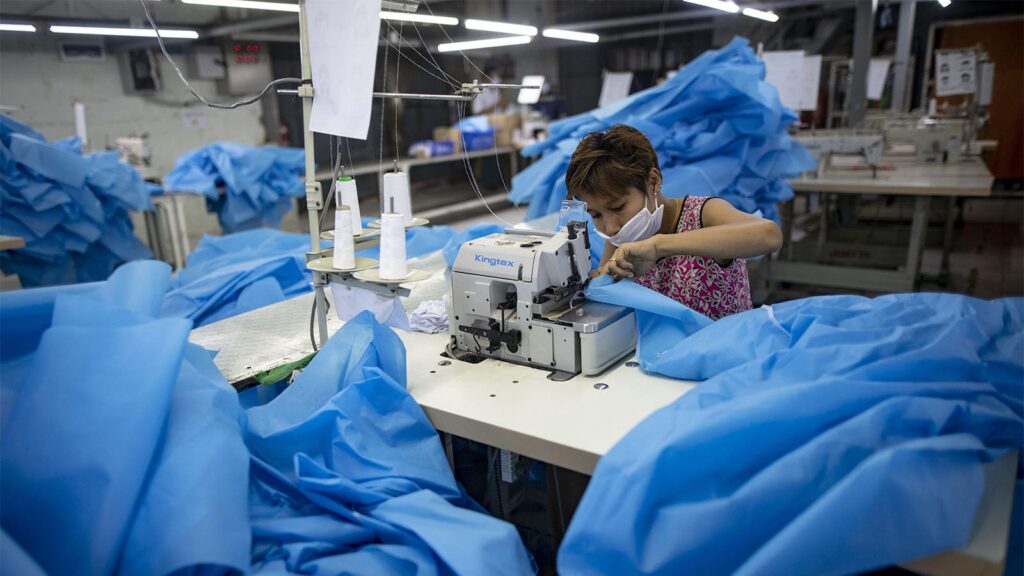Stoklosa is an emergency physician and the chief medical officer of an anti-trafficking non-profit organization.
While much of the focus in healthcare related to human trafficking has been on identifying and supporting trafficking victims in clinical settings, there is another critical dimension that deserves attention: the exploitation embedded in the labor and supply chains that sustain the healthcare industry.
Modern healthcare systems rely on complex global supply chains to source medical supplies, pharmaceuticals, and equipment. These supply chains often span multiple countries and industries, many of which are vulnerable to forced labor and other forms of trafficking. Additionally, labor exploitation — including outsourced services like cleaning, catering, and construction — poses a significant ethical concern. Addressing these issues is not only a moral imperative but also an ethical obligation aligned with the core mission of healthcare: to protect and promote human dignity.
Scope of the Problem
Human trafficking infiltrates global supply chains across industries, including healthcare. The Department of Labor has identified goods linked to forced labor, such as gloves, surgical instruments, and electronics used in medical devices. For example, reports have documented instances of exploitative labor practices in the production of rubber for medical gloves and cobalt for batteries in medical equipment.
The issue extends beyond goods to include services. Outsourced labor — such as janitorial, food service, and construction workers — is often at high risk for exploitation. These workers may face unfair wages, unsafe working conditions, and coercive practices that align with the definition of trafficking.
The scope of this problem is vast. The International Labour Organization estimates that 27.6 million people are trapped in forced labor globally, with many working in industries that supply critical goods or services to hospitals and clinics. When healthcare organizations unknowingly procure products or contract services tainted by trafficking, they may contribute to the perpetuation of exploitation. This undermines the ethical principles that underpin the medical profession.
Current Gaps in Healthcare Awareness and Policy
Despite the reality of trafficking in supply chains and labor practices, many healthcare organizations remain unaware of its extent and few have robust mitigation strategies. Transparency is a significant challenge; many organizations do not have clear visibility into the origins of the products they purchase or the labor conditions of outsourced workers. Procurement and contracting processes typically emphasize cost, quality, and outcomes, with minimal attention paid to ethical sourcing.
Moreover, accountability measures are scarce. Few healthcare organizations are staffed to conduct thorough supply chain audits or implement anti-trafficking clauses in contracts with suppliers and service providers. This oversight can allow exploitative practices to persist, undermining the industry’s commitment to health and human rights.
The Role of Healthcare Organizations
Healthcare organizations are uniquely positioned to lead on ethical procurement and labor practices. Their mission statements often emphasize principles such as compassion, integrity, and respect for human dignity — values that are fundamentally at odds with any form of human trafficking.
To address this issue, healthcare organizations can take practical steps to evaluate and mitigate trafficking risks in their supply chains and labor practices. These include:
- Conducting supply chain and labor audits: Regular audits can identify high-risk suppliers and outsourced labor arrangements linked to forced labor. Tools like KnowTheChain’s benchmark reports provide valuable insights into industry practices and vulnerabilities.
- Implementing transparent procurement and contracting policies: Healthcare systems should require suppliers and service providers to disclose their labor practices and certify that their goods and services are free from forced labor. Including anti-trafficking clauses in contracts can establish accountability.
- Providing training and resources: Educating procurement teams and human resources departments about trafficking risks and ethical sourcing can empower them to make informed decisions. For a comprehensive set of resources you can use “Mitigating Human Trafficking Risks” in the healthcare supply chain. These resources give key stakeholders the necessary tools to comprehend and tackle the risks associated with forced labor in supply chains, encompassing direct and indirect procurement.
- Learning from successful interventions: Some organizations have already taken meaningful steps. For example, the U.K.’s National Health Service (NHS) has implemented modern slavery risk assessments for suppliers and labor contracts. Such initiatives can serve as models for healthcare systems worldwide.
Call to Action
The healthcare industry has the tools and influence to set a powerful example in combating human trafficking. As individuals and institutions, we can:
- Advocate for and adopt supply chain and labor audits.
- Partner with organizations dedicated to ethical labor practices.
- Develop and enforce anti-trafficking procurement and contracting policies.
- Use National Human Trafficking Awareness Month (January) as a platform to educate stakeholders about this hidden crisis.
Healthcare leaders must recognize that ethical procurement and labor practices are not optional initiatives — they are fundamental aspects of fulfilling their mission to care for and protect all people. By addressing trafficking within their supply chains and labor practices, healthcare organizations can lead by example, inspiring other industries to follow suit.
We have a collective responsibility to combat exploitation in all its forms. For healthcare organizations, this responsibility extends beyond patient care to the very systems that enable their operations. By taking concrete steps to eliminate trafficking and unfair labor practices from their supply chains and labor practices, healthcare leaders can honor their commitment to human dignity and set a standard for ethical leadership. The challenge is significant, but so is the opportunity.
Hanni Stoklosa, MD, MPH, is the chief medical officer of the non-profit organization HEAL Trafficking, and an emergency physician at Brigham and Women’s Hospital in Boston. The views expressed here are her own and do not necessarily reflect those of her employer.
Please enable JavaScript to view the

